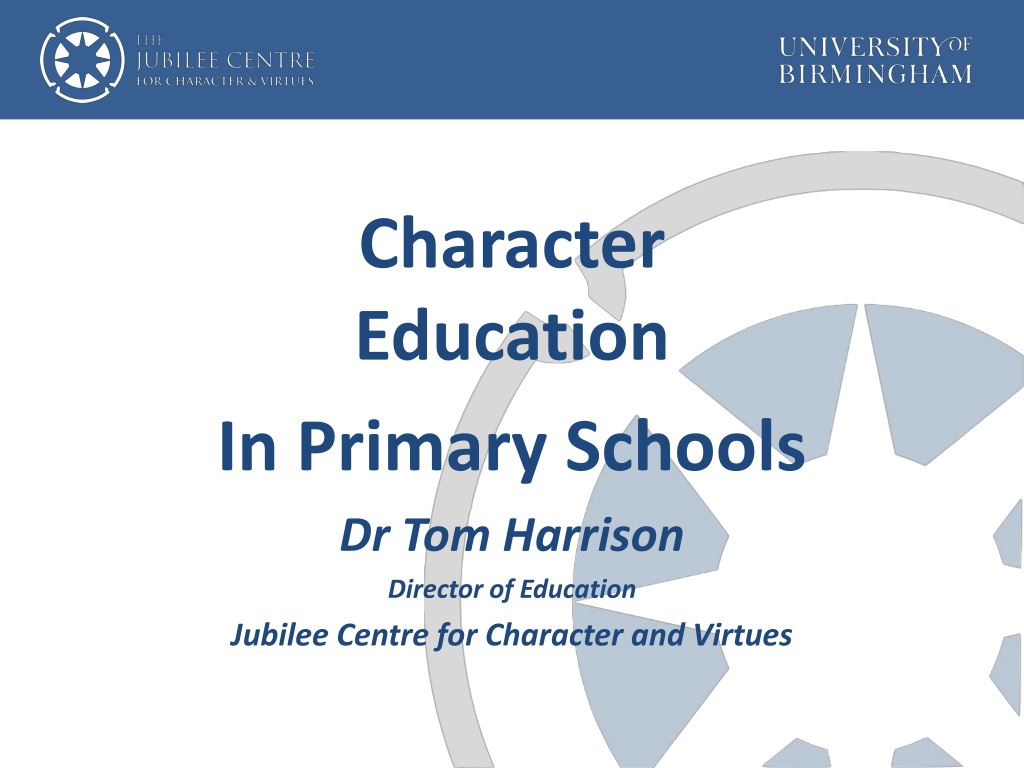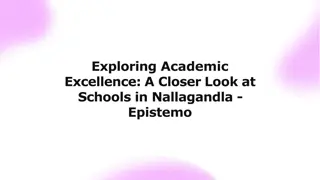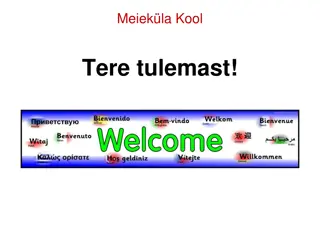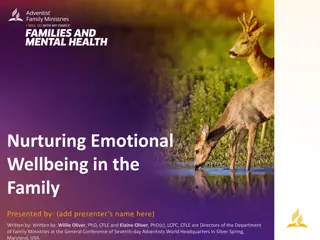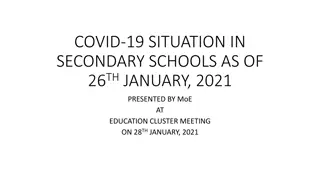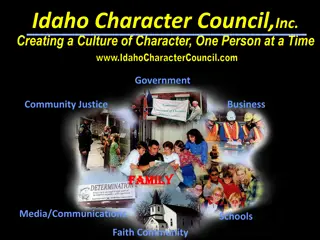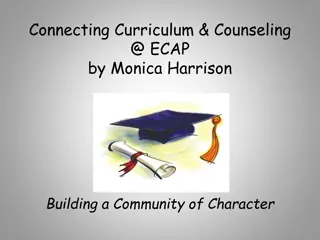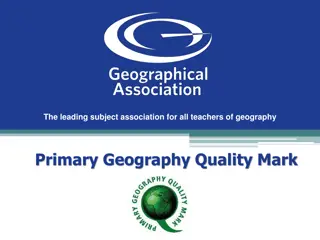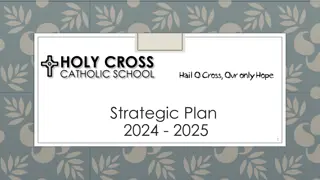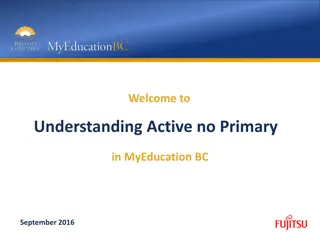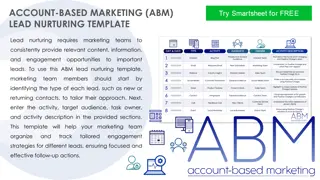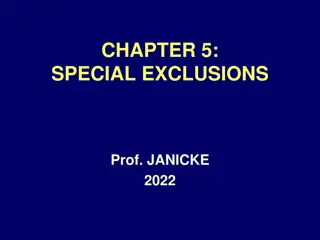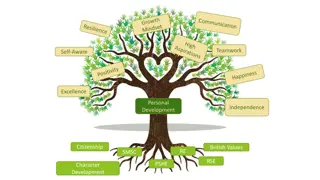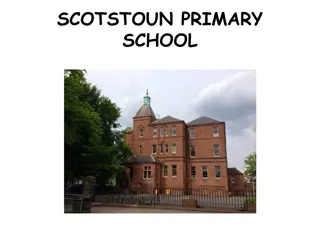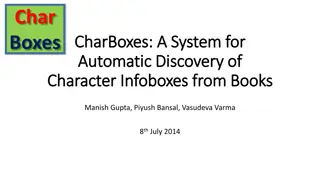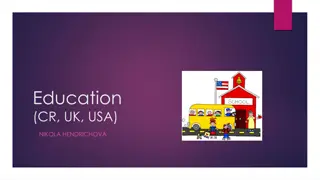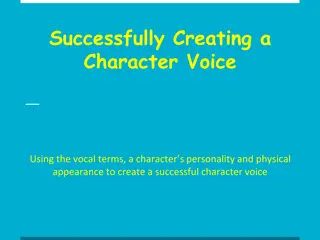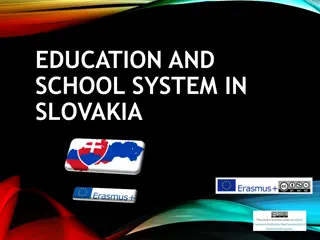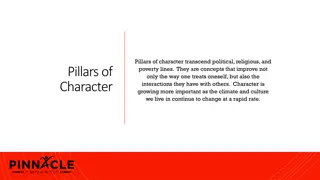Nurturing Character Education in Primary Schools
Explore the importance of character education in primary schools as a tool for developing virtues and instilling values. Learn about key approaches, virtues taught, and the Caterpillar Process for fostering self-awareness and positive character traits in young students.
Download Presentation

Please find below an Image/Link to download the presentation.
The content on the website is provided AS IS for your information and personal use only. It may not be sold, licensed, or shared on other websites without obtaining consent from the author. Download presentation by click this link. If you encounter any issues during the download, it is possible that the publisher has removed the file from their server.
E N D
Presentation Transcript
Character Education In Primary Schools Dr Tom Harrison Director of Education Jubilee Centre for Character and Virtues
Thank You Film Awards Lollypop Lady: www.youtube.com/watch?v=sLzQiwPEuk8
The Function of Education is to teach one to think intensively and to think critically. Intelligence plus character, that is the goal of true education Martin Luther King
Schools of Character Report All schools should enable students to become good persons and good citizens, able to lead good lives, as well as to be successful persons. However, it is important that the character education is intentional, planned, organised and reflective, rather than assumed, unconscious, reactive and random.
Caught Approaches Values driven schools Partnership with parents and community Assemblies Service Learning Special programmes e.g. Forest Schools The single most powerful tool you have to impact a student s character is your own character
Primary Taught Approaches Programme of Study 4-11 year olds Focus on a key virtue each term Virtue Knowledge Virtue Reasoning Virtue Practice
Virtues Autumn Caring Helpfulness Cooperation Courage Kindness Summer Courtesy Forgiveness Determination Self-discipline Gratitude Honesty Spring Cleanliness Fairness Friendliness Service Patience Respect
The Caterpillar Process 1. Stop. This involves having the self-control and discipline to pause to assess the situations we find ourselves in. It marks a shift from being carried along by emotions and situations to making deliberate choices. 2. Notice. This involves being aware of the events that take place both in the world around us and also in our own interior landscapes. It demands that we always strive to gather as much information as possible to help us to decide well. 3. Look. This involves paying attention to our own emotions and the emotions of others. Our emotions provide us with information about what we perceive in situations and also, what others perceive. 4. Listen. This involves examining our motivations for acting, the reasons why we are doing what we are doing and the reasons that other people give for their actions. It involves being critical and adjusting our motivations and feelings so that we might do what is good. 5. Caterpillar. In The Very Hungry Caterpillar, the colours of the foods eaten by the caterpillar appear on its wings as a butterfly. In a similar way, our thoughts, speech and actions become our habits and form our character. This part of the process requires the learner to think about the person they are becoming and how their thoughts, speech and actions contribute to that.
The Knightly Virtues Educating character through stories Virtue Literacy Controlled Trial Years 5 and 6 10 Stories + supporting materials
Knightly Virtues Film www.youtube.com/watch?v=f39TLJj-xL8
Teaching Character Through the Curriculum Science, Maths, English + other subjects Virtues for Transition Stage Narratives based Explore the grey areas dilemmas
Subject Narratives Primary Virtue Definition Secondary Virtues English Journalistic Writing Courage Under Fire John Simpson (BBC Foreign Correspondent Reported during Tiananmen Square massacre, 1991 Gulf War, Kosovo conflict) Finding X Emmy Noether (German Jewish mathematician known for her landmark contributions to algebra) An Ambition to Cure Gertrude Elion (Biochemist and pharmacologist, who won 1988 Nobel Prize) Olympic Spirit Luz Long (1936 Olympics German long jumper his main rival was Jesse Owens. With Hitler watching, Owens foot-faulted twice in the qualifying round and was at risk of disqualification when Long suggested that he mark out his run again. Owens won gold, with Long taking silver) Inspiring a Nation Winston Churchill (British Prime Minister during WW2) Driven to Make a Change Wangari Maathai (Kenyan environmental activist) Courage (Moral) Courage is having the strength and will to know what you should do even though you may be afraid. Resilience, Motivation, Ambition, Curiosity, Honesty, Integrity Maths - Algebra Focus (Intellectual) Focus is when you pay close attention to something and block out possible distractions. Resilience, Drive, Curiosity Science Animals Including Humans (Medicine and Drugs) Curiosity (Intellectual) Curiosity is when you are eager to know or learn something new. Resilience, Ambition, Confidence, Focus PE - Athletics Integrity (Moral) Integrity is when you adhere to the moral principles of honesty. Honesty, Courage, Optimism, Service History A study of a theme in British history. Geography - Describe and understand key aspects of physical/ human geography Computing - Coding Resilience (Performance) Resilience is bouncing back from adversity when attempting a difficult task. Drive is to move or push forward despite obstacles in your path. Motivation, Drive, Confidence, Integrity, Focus, Service Resilience, Motivation, Optimism, Service Drive (Performance) Code Breaker Alan Turing (Mathematician and computer coder who broke Enigma code during WW2) Local Hero examples from the #iwill campaign http://www.jubileecentre.ac.uk/userfiles/jubileecentre/pdf /iwillbrochure.pdf (Freedom for school to pick a local hero appropriate to them) Service (Civic) Service is working hard for a person, organisation or country. It is helping other people. Resilience, Drive, Curiosity PSHE / Citizenship (Volunteer/Charity) Charity (Civic) Charity is the voluntary giving of help to those in need.
Virtue Knowledge Virtue Toolkit Definition of virtue terms and their real life application. Children to think about these virtues in their own life. Virtue Practice Through reflective children make a specific and realistic IWILL target based around the primary virtue. Targets are achievable and meaningful to the child. Virtue Reasoning Children show virtue reasoning by comparing and contrasting primary and secondary virtues. Critical engagement through narratives leading to discussions and written feedback. practice
Thank You Film Awards Daddies www.youtube.com/watch?v=VOpeOdae1A0
Thank You Letter Awards Annual Contest 50 prize fund for schools that participate Free letter templates Closing date 21st March Schools Gratitude Day 21st May
